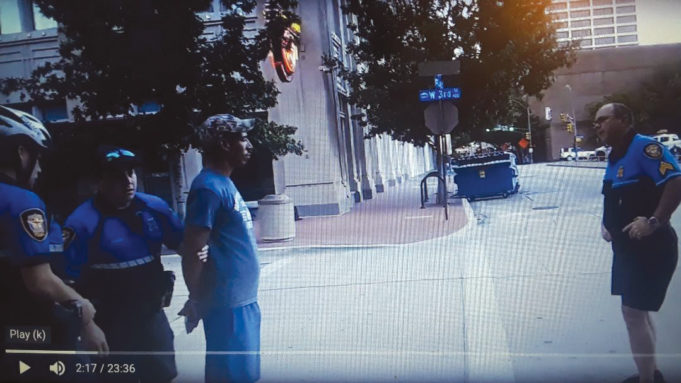Lorenzo Thomas’ first memory after waking up in John Peter Smith Hospital (JPS) was hearing a Fort Worth police officer talking to a nearby medical worker.
“We did one chest compression” on him, Thomas alleges officer Daniel Hafer told the medical worker.
Thomas’ arrest and hospitalization in mid-2019 are the subjects of a civil lawsuit that he recently filed against two Fort Worth police officers: Bike Patrol Unit members Michael Cagel and Hafer. Thomas, a self-described asthmatic, doesn’t remember the moment when he lost consciousness that day, but he believes the officers’ use of pepper spray impeded his breathing and led to the need for emergency medical care.
Thomas said he was handcuffed to the hospital bed and unable to open his eyes due to the large quantities of pepper spray that were allegedly used during an altercation he had with Cagel, Hafer, and an unidentified third officer on August 15, 2019.
“The pepper spray was all running down my face,” Thomas recalled. “They finally wiped my face off. I was still in fear of what [Cagel and Hafer] would do to me. I didn’t want to leave with those officers.”
When reached for comment, the Fort Worth police department’s media team requested that all questions go through an open records request. The police did not answer my questions filed through the Texas Public Information Act by the time this story went to print. Numerous media stories list Cagel as retired as of 2020.
Thomas was eventually taken to Tarrant County Jail by an unidentified Black police officer for allegedly resisting arrest earlier that day. Thomas believes Cagel and Hefer left after dropping him off at JPS to change their uniforms, which were likely covered in pepper spray. During the medical screening process, Thomas said he was separated from the general jail population, possibly because he appeared to be having a mental health crisis due to the trauma of his arrest and hospitalization.
“The whole time, I was kept naked,” Thomas alleges. “I hadn’t had a shower. The chemical agents ran down my body and onto my private area. I had to lay on the floor that had a vent because that was the only comfort I could get.”
The episode, and the events leading to his hospitalization, still haunt Thomas, whose voice trembled when he recalled the more traumatic moments of his arrest.
The pending lawsuit, filed in the United States District Court for the Northern District of Texas on May 27, alleges that “in August 2019, Lorenzo Thomas was illegally arrested and pepper sprayed in retaliation for filming and protesting the misconduct and the mistreatment of the homeless living downtown by the Fort Worth Police Department (FWPD).”
Thomas, a Black man, was part of Fort Worth’s unhoused population at the time, and he frequently and vocally criticized the Fort Worth police officers who came to Fort Worth’s downtown public library to allegedly intimidate the homeless population who slept and lived outside of the building.
According to court documents filed by Thomas and a 25-minute cellphone video that I reviewed, officers Cagel, Hafer, and an unidentified third male officer, dark-skinned but non-Black, approached Thomas on April 15, 2019, at the downtown public library. The officers informed Thomas, who was seated during most of the video, that he had an outstanding warrant in Arkansas. Thomas said the original charge was for possession of two pounds of marijuana.
Cagel, who was indicted for embezzling up to $150,000 from a local charity in December, according to the Star-Telegram, told Thomas that they were going to take him to Arkansas and that the Fort Worth police was going to pay the transportation bill. The idea of three on-duty officers driving possibly hundreds of miles to turn Thomas over to Arkansas authorities who had not requested extradition struck Thomas as alarming and possibly a ruse to harm or kill him.
Cagel’s past public support for rogue cops has furthered Thomas’ belief that he was targeted both for being Black and homeless. Last fall, Cagel called WBAP, a local right-wing talk radio station, to voice support for Roger Ballard, a white Fort Worth police officer who was fired last October after posting a meme on Facebook of a Black man in a coffin with the caption, “THE FACE YOU MAKE WHEN YOU DON’T UNDERSTAND STOP RESISTING.”

Courtesy of Facebook
“This is all about not having our back,” Cagle said on-air. “They’re bowing down to all these protesters.”
The three officers handcuffed Thomas, drove him past nearby Tarrant County Jail, and parked at a Fort Worth police department substation, where the officers transferred him to another vehicle, one that was not logged for use that day, as Thomas alleges in the suit.
“Using a patrol vehicle that isn’t signed out would allow an officer to travel without being detected or his location being tracked,” the lawsuit alleges. “Thomas felt he was at imminent risk of serious harm or loss of life.”
Thomas said his only recourse was to make as much of a scene as he could before the three officers left Fort Worth. He repeatedly banged his head on the plexiglass divider that separated the front and rear compartments.
“Cagel says, ‘If he continues to do it, spray him,’ ” Thomas alleges. “They took a leash and wrapped it around my ankles and tied it to the floorboard. Then they tightened the seatbelt so I couldn’t move. At this point, I’m yelling. They stopped the car again. Hafer sprayed me with mace. I guess they forgot that they have my legs anchored down [to the floor]. They kept pulling me. I got slammed to the ground. At that point, all I remember is waking up” at JPS.
Having lived on the streets in Fort Worth for the past few years before recently returning to his hometown in Ohio, Thomas has seen how some areas of the city are protected more than others when it comes to local policing habits. After stints on the South Side and East Lancaster Avenue, Thomas noticed that repeated interactions with Fort Worth police only began when he moved downtown. He believes that Fort Worth’s power brokers see the local unhoused population as a blight that needs removed.
Thomas shared a cellphone video taken by his then-girlfriend as an example of homeless treatment by police. The video shows Thomas sitting against the public library downtown as a police officer accuses him of blocking the sidewalk — a potential Class C misdemeanor for “making personal use of a sidewalk,” according to a Fort Worth police department spokesperson who was not commenting specifically on our story. In 2017, Fort Worth City Council unanimously approved a tougher ordinance that bans panhandling on all public property and private properties under certain circumstances.
Supporters of the ordinance and similar measures point to ample charitable services that are available for those who are struggling financially. Thomas said he doesn’t engage in panhandling, but he believes the ordinance and selective policing habits in Fort Worth effectively criminalize poverty and encourage harassment of the local unhoused population.
A 2019 report by Texas Criminal Justice Coalition, a research and advocacy nonprofit, found that “homelessness and justice system involvement are inextricably linked. People experiencing homelessness are 11 times more likely to face incarceration when compared to the general population, and formerly incarcerated individuals are almost 10 times more likely to be homeless than the general public.”
According to the U.S. Interagency Council on Homelessness, nearly 50,000 people a year enter homeless shelters directly following release from correctional facilities.
Thomas is requesting body camera footage from the police named in his lawsuit and a trial by jury.
Due to the “malice, evil intent, and reckless or callous indifference” of the officers named in the suit, Thomas is seeking “punitive damages, reasonable attorney’s fees, and costs of court,” according to the lawsuit.












